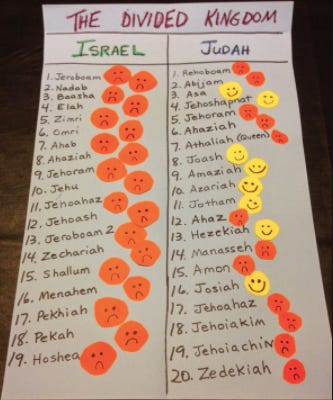
Several years ago, I downloaded an app that charts my Bible-reading (Hebrew and Christian scriptures, or what non-seminarians call the Old and New Testaments). Since then, at three or four chapters a day, I read my Bible (New International Version) all the way through once a year. I choose to read it chronologically, which is weird, because that puts you into the religion-on-meth book of Revelation around the holiday season, and there’s nothing about six-winged oxen covered in eyes that says “Merry Christmas!”).
But let’s be honest. Some chapters are dull. I glaze over the begats, though I do sometimes wonder how the multi-syllabic names would have been pronounced, or did people just default to nicknames.
I would never argue that my approach is a scholarly one — at all — though it leaves room for discovery. For instance, I found recently that Jesus traces his earthly lineage back to Seth, the mostly-ignored third son of Adam and Eve. Who hasn’t heard of Seth’s older brothers, the lamentable Cain and Abel, the brother Cain killed. But Seth?(I’m saving this information for my next “Jeopardy!” appearance as I’m not sure where else it will be relevant.)
Fundamentalists are trained to go to the Bible for everything but omelet recipes, which means I am more likely to stumble onto that Seth-to-Jesus thing than people like my husband, a fine man who was raised Roman Catholic. Here is something he actually said once:
“Wait! Moses. Was he the one with the boat?”
(Was he teasing? I didn’t take the time to ask, choosing instead to launch into the whole story of Moses in the bulrushes, and then segueing into Noah (the one with the boat), all without my trusty felt board.)

The mind wanders, is what I’m trying to say. In a similar way, I realized recently that the books of Kings (I and II in the Hebrew scriptures) and Chronicles (ditto) could be a self-help book for people who want to learn how to be bad leaders. The books include a list of people unequal to the task, including bad leaders who lied, ignored smart people’s advice, postured, and killed people to get and stay in power. Sometimes, those people they killed included their own children, which I think we can all agree is a bridge too far.
I love that some of us have retained the capacity to be stunned at leaders’ decisions that deeply hurt vulnerable people. I love that we can still be stunned that someone would want to continue the era. In the last days of Trump, our eyes move to Sen. Josh Hawley, a Missouri Republican who has insisted he’ll try to throw a monkey wrench into the works next week when the Congress meets in a joint session to certify the election of President-elect Joe Biden.
We shouldn’t be stunned, though. This nonsense has always been with us. In no particular order and without going into who ruled what kingdom when, here’s a short list of bad Hebrew scripture leaders. See if any of this sounds familiar:
Jeroboam appointed high priests willy-nilly, choosing mostly his friends who showed no talent for high-priesting, and so they botched the job. At a time when the culture relied on the leadership of high priests, this was especially damaging. Jeroboam was so bad, God — God! — said this about him:
“You have done more evil than all who lived before you.”
Ahab persecuted Elijah, a prophet. Imagine if there’d been Twitter.
Rehoboam, who, as King Solomon’s son showed some significant daddy issues, consistently ignored good advice and was a bully. In an effort to rise above his father’s reputation, Rehoboam doubled down on a reign of terror. It didn’t work, but the story does leave us with this pithy quote from the bad king, himself:
“My little finger is thicker than my father’s loins. Now, whereas my father laid on you a heavy yoke, I will add to your yoke.”
Athaliah (daughter of Ahab and Jezebel) destroyed her family for power. Enough said.
Hoshea was a flat-out traitor.
Most of these leaders also “went to the high places,” which, in general, is Bible-speak for worshiping gods other than the Hebrew God. In the Christian scriptures, “going to the high places” would most likely mean putting one’s own ambition in front of God.*
In the Bible, there are no loose ends. Stories end with someone getting theirs, good or ill. All these bad leaders came to horrible ends. It’s comforting, that way.
* See Josh Hawley, above.








Where does Cyrus fit in (I don't see him on the list) and why has T**** been compared to him? Was he a Good King or a Bad King?